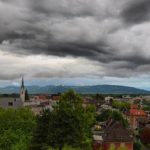Architektur | Kultur
Hotel Rhomberg EN
-
„Excluded from Settlement“
A high proportion of immigrants in Vorarlberg always was and still is from Germany, although they are not perceived as foreigners in the public’s mind.
This was different in the last decades of the 19th century, because many of the German immigrants were Protestants. In 1861, there were approximately 400 Protestants in Vorarlberg. The Dornbirn-based doctor and state parliament representative Anton Ölz initiated a petition to prevent people of Protestant faith from settling in Vorarlberg.Quote 1:
Petition by Dr. Josef Anton Ölz, 1861
„I urge the House to acknowledge that we demand from our delegates, whom we have entrusted in good faith with the holiest matter of the state, that they commit themselves in the name of His Apostolic Majesty, especially in the face of the great danger threatening our ancient rights inherited from our Fathers, to maintain the union of faith – meaning Catholicism – in the State of Vorarlberg, and to ensure that the Protestants are excluded from settlement.“Dr. Ölz was not successful with his petition. He was even convicted of hate speech, although the sentence was later revoked. In Dornbirn, the first Protestant mass took place in the Hotel Rhomberg in 1903. In 1930/31 the ‘Heilandskirche’ (Church of the Savior), which was planned by architect Otto Bartning, was built in the Rosenstraße (Rose Street).
In the meantime, however, an incident occurred, which is reflects the atmosphere of the times. On the 21st of April in 1912, a Protestant child was buried in the cemetery in Markt, the center the city. The following February, the this text appeared in a newspaper under the headline “Religious Intolerance”:
“On the 21st of April of last year, a Protestant child was buried in the local cemetery. The funeral was held by Pastor Krcal from Bregenz. As he was about to carry out the funeral in accordance with Protestant customs, a man, allegedly the gravedigger, interrupted him to tell him that the city pastor Ender wanted to inform him that a funeral oration would not be permitted. The pastor, of course, was not deterred by the command, which was so delicately conveyed at the open grave, and he held a short speech – which is expressly permitted by law. Since then months have passed, and Pastor Krcal has not filed a lawsuit against his Catholic brother for interference in religious matters, although he would have had the legal basis for it.
The city pastor, however, felt it was he who was being wronged, and so he went to the authorities after 9 months to file a complaint against the Protestant pastor! It would be appropriate to comment about Pastor Ender’s more than peculiar behavior, but we want to leave it up to our readers to draw their own conclusions. The fanaticism of Pastor Ender borders on pathologically ridiculous behavior.”
What followed was a long trial. In 1915, the court eventually ruled in favor of the Protestant pastor, since “the right to a proper funeral goes hand in hand with the right to a funeral oration”.stadtarchiv.dornbirn.at/menschenspuren
www.vielfaltenarchiv.at/menschenspurenPräsentiert von: Amt der Vorarlberger Landesregierung - Kultur
Autor: Stadtarchiv Dornbirn -
Anfahrt:
Anfahrtsplaner -



